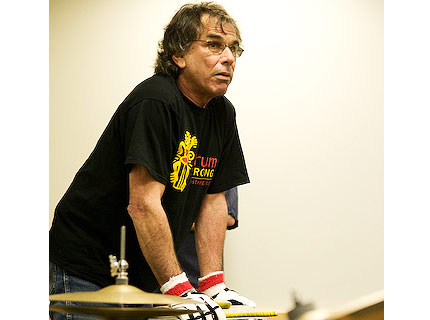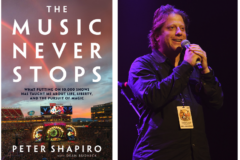Bake up a pan of your “special” brownies, and slip into your best tie-dye: The Grateful Dead are back!
Even President Obama is excited. He recently invited the legendary San Francisco band to the White House to praise their efforts in supporting him — and in advocating positive change for the country.
The group, who gigged sporadically as the Other Ones after guitarist Jerry Garcia died of heart failure in 1995, is now known simply as “the Dead,” with Allman Bros. sideman Warren Haynes filling Garcia’s role on their 19-date spring tour.
SPIN.com sat down with drummer Mickey Hart before the band’s Long Island show. (Read a review here.) Hart, 65, told us about the reunion, why this President is different from the last, and how drumming might one day cure Alzheimer’s.
The Dead played a few gigs to support Obama’s campaign. But this is the first full-on tour since 2004. Why now?
Quite a few reasons. We hammered out our differences, politically, musically, socially, and we realized that the Obama gigs were kind of a catalyst. It brought us together in a musical situation and not in a business sense. The business was what confused everybody. We lost our center, and everything became very strange. There was a lot of politics, and everyone had their own manager and agendas, and it couldn’t click back in place in a meaningful way. So we just pursued our music in our own ways. Bob [Weir/guitar] did his thing, Phil [Lesh/bass] did his, and it kept us in the game.
What was it about the Obama campaign that got you guys really excited?
It was a desperate time. We had eight years of a former administration that almost took this country’s heart out. We figured that even though we were never into politics, this would be a good time to get involved. The country was at stake, our kids and our grandchildren. The future was crumbling. It was a larger issue than our individual differences. We all agreed that needed a change and we believed in this man. He said the right things and we knew he could be a great statesman. Phil called me up, “You wanna play?” “Sure,” I said. So we played a benefit at Penn State University, in a swing state, and it went well. We enjoyed ourselves. We were all in a room at one time — and that hadn’t happened for years.
You performed at one of the inaugural balls. What was that like?
The inaugural ball was a drag. There was too much security, although it was necessary. We only played a little. It wasn’t a musical experience; we did it for other reasons. We were honoring the event, the moment in time. Meeting the president and the first lady was really a wonderful experience. He’s a real human being. You know, you’re walking down the hallway in the White House and you don’t know where you’re going, then and all of a sudden a door opens, and Obama’s like, “Hey, come on in Mickey, this is a good place to talk.” Amazing.
Did you two talk about music?
No. I talked about his desk, the significance of the desk, and getting traction with his policies.
After playing as the Other Ones for years, was there any hesitancy to return to old name?
No, not really. When Jerry passed a big chapter of the Grateful Dead was gone, but we were still the Grateful Dead. Jerry wasn’t the whole Grateful Dead, but he was a huge part of it. Out of respect for him we thought that the best thing for everyone, including ourselves, was to regroup. We had a band, we had a whole cannon of music.
So in some ways it’s a tribute to Garcia.
Yeah, you could look at it in those terms. Of course, we woke up one day and realized that we were the Dead anyway. We had the feeling, we had the music — we just didn’t have Jerry. So we thought that the Dead would be appropriate, and the fans know that.
What is it that you miss most about Jerry being onstage?
He was a great player and he took us to beautifully, intricate places. It was an endless, beautiful rhythm. He could play rhythm guitar, he could play lead guitar. And he was an extraordinarily gifted writer. He’s still in my ear. I can still hear him.
The Grateful Dead hasn’t released a new studio album in two decades. Are you guys talking about recording new music?
First we wanted to come together as a band. We had to bring in Warren [Haynes on guitar] and Jeff [Chimenti on keyboards] and make this a band and not just a bunch of musicians playing from onstage and calling themselves the Dead. So the first thing was to adopt a “group” mind. So once we get that, if we enjoy ourselves and we want to do this again, then of course, new material will crop up. You got to take things as they come.
Is it kind of nostalgic now, playing some of the Dead’s classic tunes?
I’m getting used to it. He hasn’t been around for years; he’s just not here. But he’s here with me and everyone else that was exposed to him. You move on, you have to get back on the horse and ride it, create a new band. And that’s what we’re doing.
Some younger audiences haven’t been exposed to the Dead. What do you think the band has to offer them?
Well firstly, we have Robert Hunter [writes but doesn’t perform with the band], who is one of the greatest lyricists on the planet. He writes these beautiful words that have such great meanings. And we’ve got the groove. We’ve got the feeling, the brotherhood, which allows us to play in synch with each other onstage. That’s power — and that’s what they’ll get. The Grateful Dead is a work in progress, always has been, always will be. If that ceases then the band will cease to be the Dead. This music is full of experimentation, full of searching.
I know that you’re really involved in the therapeutic value of drumming. Can you tell me a little about that?
Vibrations are a very powerful force. They’re the primal element that created our universe — the Big Bang, the rhythm of the body, the rhythm of cultures, stars, and gravity. All that has vibratory origin. We were finding that the real frontier in neurological function now is how vibration can affect synapses and help the motor-impaired, those with Alzheimer’s and dementia. With PET scans and brain imagery, we’re able to see inside the brain, see what parts of the brain light up before, during, and after an auditory experience. That’s really fascinating. And once you codify that and you can repeat it, then it’s medicine and a doctor will be able to ofer a musical prescription.
Do you remember the first time you knew that drumming was your calling?
I loved it when I was three or four years old. But it really happened on a beach when I was playing bongos. I must have been nine or 10 years old, and I was there by a fire with some older kids. I was just playing my bongo and all of a sudden the girls started dancing, and I said “Ah, chicks, this is it for me.” So it was all about the mating ritual, even at 10 years old. The drum in my hand was really empowering. It attracted young ladies. And that’s what you do when you’re young.
Tell me about the Global Drum project. When can we expect more music?
Next year we’ll get back together to do some more Global Drum stuff — I really miss it. That pops up in the middle of all of this, and the Dead is my day job. Global Drum won a World Music Grammy in ’91. And we’ve had other ones through the years, too.
You’re always traveling in search of new music. Can you tell me about some of your experiences?
Whenever I travel I take a recording machine with me. Before I go, I learn their music. That’s the first thing you have to do — you don’t walk in there as a tourist. You have to really understand the sensibilities of their music, what’s good and what’s not, and have some kind of dialogue with the natives. Work out some kind of recording situation with them, and learn from each other. And I’ve done that in the Arctic Circle, in an archipelago of Bali, and even Egypt.
Do you have a favorite style?
Egyptian drumming happens to be a favorite of mine. It’s a really simple instrument, but it’s really difficult to play. You can take it anywhere with you — you can play it in your room, in an airport. It’s very quiet, so you explore the quiet side. It’s more like romancing a drum than beating it and slapping it around. This is very delicate and sensual.
I recently re-read an article about the infamous drug bust at the Grateful Dead house in 1967. What’s it like to look back on those days in San Francisco?
We were kids doing what kids do — and we were set up! Not that there wasn’t a lot of dope in the house, but the inspector actually planted the stuff that they arrested us for. They could have gone into our cabinet and found a whole bunch of it. We were set up, but it made us famous. Getting busted was the best thing that ever happened to us. We made headlines. It certainly didn’t stop our way of life — in a way, it validated it. We thought that these people really violated our sanctity. We didn’t take it sitting down. So I look back on it and go, ‘Wow, that was really fun.’
Do you feel like the spirit of the ’60s is still alive and well today?
It was a different spirit back then. We were angry, there was a war going on, terrible leaders, we didn’t know what we know now. We were just into playing music, that’s all. We weren’t drug dealers; we were just casual users. Kids are doing it now as well, but it’s not quite the same. People will always try to find themselves and their place in the world.
Did you ever think that you would be doing this 40 years later?
I did. When I heard Grateful Dead music, I knew that it was the most powerful force on the planet. I had a dream once where everybody was wearing a Grateful Dead shirt, and that was a big tip-off. Dreams sometimes foretell the future. The band was so powerful and so positive that I knew it was only for good. Only an act of God could stop it, and we still haven’t been stopped. We’re kind of like cockroaches. In the end it will be the cockroaches and us.





